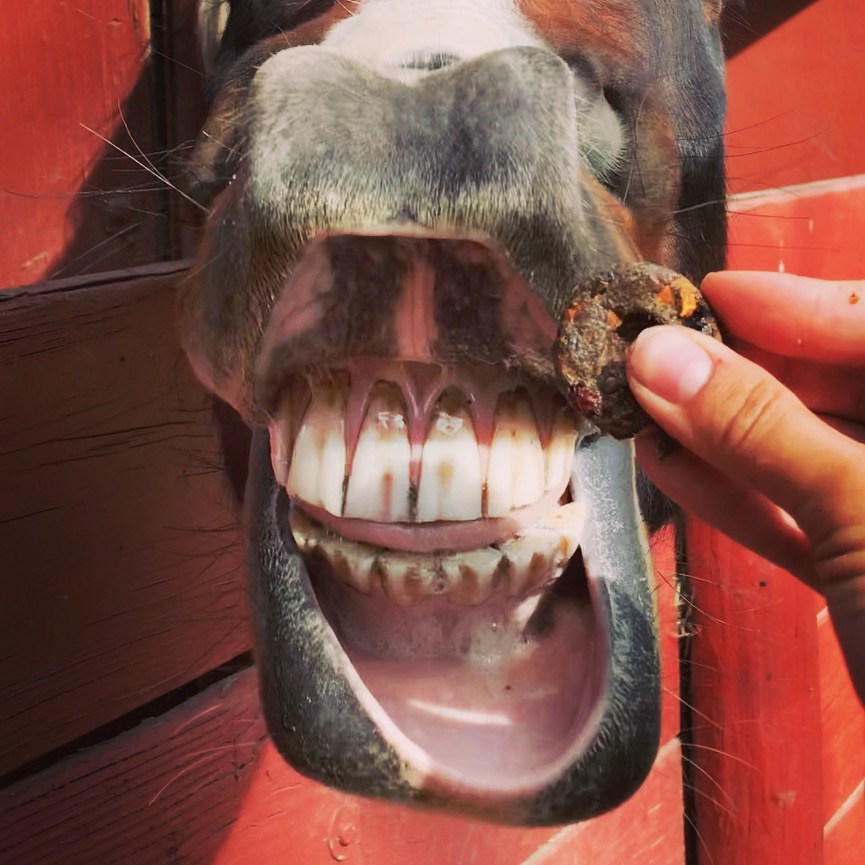5 Ways to Help Prevent Gastric Ulcers In Horses
- Twenty Four Carrots

- Oct 1, 2019
- 3 min read
Updated: Jul 9, 2023
Equine gastric ulcers are due to the erosion of the lining of the stomach which can occur if the stomach lining has prolonged exposure to stomach acid. Ulcers can affect horses of any age. Prevention is key and fortunately, ulcers are quite easy to prevent. Here are 5 helpful tips to prevent equine gastric ulcers...

1. Use a slow feeder hay net.
Free choice hay is great and will prevent ulcers but it’s not always the best option for an easy keeper or a horse who needs to lose weight. Using a slow feeder hay net (with small 1” or so holes) is the ideal way to manage how much your horse consumes while increasing their chew time. The longer they chew, the more saliva they produce and the saliva will help dilute the stomach acid. In an ideal situation a horse is chewing throughout most of the day. To mimic what a wild horse does, try and feed smaller meals more frequently throughout the day in a hay net.
2. Do not work on an empty stomach.
During exercise, acid production increases and working a horse on an empty stomach is a recipe for developing nasty ulcers. Be sure your horse has had some hay before exercise as to dilute the stomach acid that is already present as well as the extra stomach acid that is produced while being worked. If you are in a time crunch before you ride and your horse has an empty stomach, we recommend hanging a hay net in the area that you tack up. This will allow your horse to grab some food while you groom and tack him. It’s a win win!
3. Be mindful of what you feed your horse.
If your ulcer-prone horse is fed concrentrated feeds containing cereal grains or molasses it would be beneficial to switch to a feed containing ingredients that have lower non-structural carbohydrate levels. Remember, a complete feeding regime is ideal. If you feed your horse hay and a low non-structural carbohydrate feed but spoil them with large amounts of sugary treats, they still may develop ulcers. As you would with your feed, do some research on healthy treats that can be fed to your horse and skip the peppermints and molasses bombs! Pro tip: Twenty Four Carrots Super Food Horse Treats are not only delicious, but nutritious too! They are low glycemic and chock full of nutrients to perfectly compliment a complete feeding regime.
4. Analyze what may causing your horse stress and adjust accordingly.
Each horse responds differently to different situations. Where one may be completely content, another may be stressed. Analyze your horse’s living conditions and daily routine. There may be something that is causing him stress that is a simple fix. An example being, if your horse is easily spooked or sensitive to commotion and noise try to move him to an area that is more quiet. If he is in a herd and being bullied, move him to his own space or try to find him new pasture mates. The examples and solutions are endless, but it is up to you to be a keen observer see if there are any changes that could be made so that your horse has the most stress-free environment possible.
5. The more movement, the merrier!
In the wild, horses are constantly moving around as they forage for food. Horses who are confined to small spaces do not have the ability to move freely while eating and thus are prone to developing ulcers. Spreading their hay in small piles throughout their pen is an easy way to encourage them to eat slowly, but to also move from pile to pile mimicking what they would naturally do in the wild.



Comments